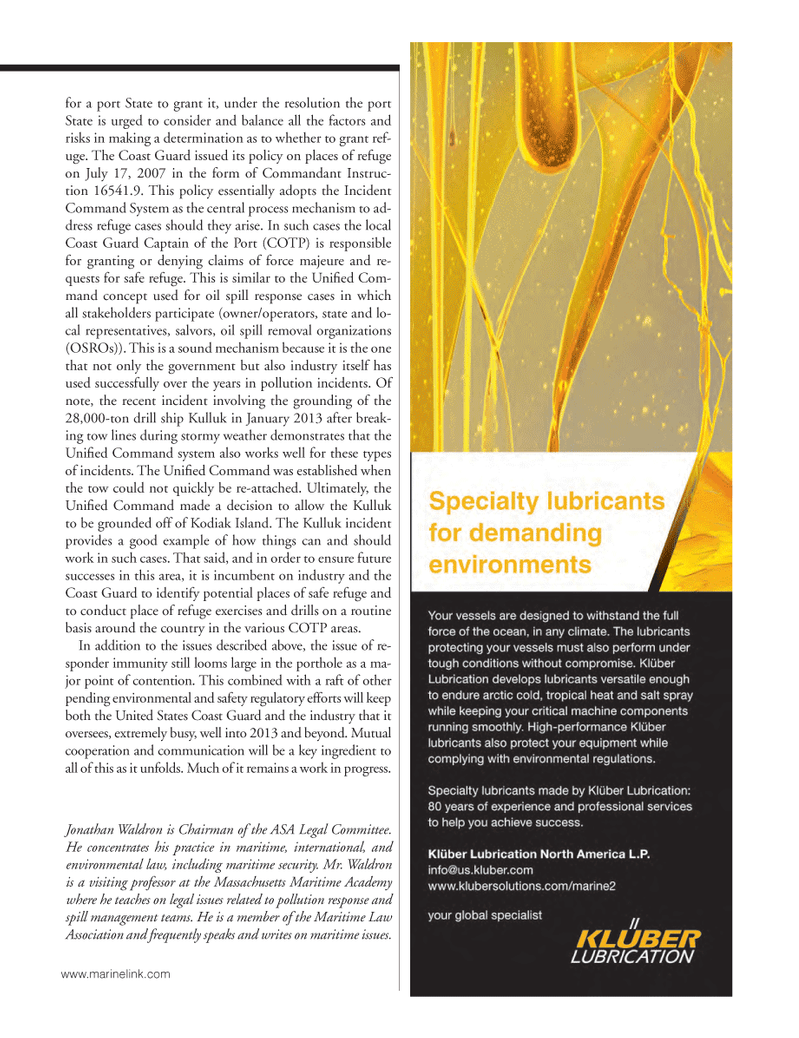
Page 21: of Marine News Magazine (April 2013)
Offshore Service Operators
Read this page in Pdf, Flash or Html5 edition of April 2013 Marine News Magazine
for a port State to grant it, under the resolution the port State is urged to consider and balance all the factors and risks in making a determination as to whether to grant ref- uge. The Coast Guard issued its policy on places of refuge on July 17, 2007 in the form of Commandant Instruc- tion 16541.9. This policy essentially adopts the Incident Command System as the central process mechanism to ad- dress refuge cases should they arise. In such cases the local Coast Guard Captain of the Port (COTP) is responsible for granting or denying claims of force majeure and re- quests for safe refuge. This is similar to the UniÞ ed Com- mand concept used for oil spill response cases in which all stakeholders participate (owner/operators, state and lo- cal representatives, salvors, oil spill removal organizations (OSROs)). This is a sound mechanism because it is the one that not only the government but also industry itself has used successfully over the years in pollution incidents. Of note, the recent incident involving the grounding of the 28,000-ton drill ship Kulluk in January 2013 after break- ing tow lines during stormy weather demonstrates that the UniÞ ed Command system also works well for these types of incidents. The UniÞ ed Command was established when the tow could not quickly be re-attached. Ultimately, the UniÞ ed Command made a decision to allow the Kulluk to be grounded off of Kodiak Island. The Kulluk incident provides a good example of how things can and should work in such cases. That said, and in order to ensure future successes in this area, it is incumbent on industry and the Coast Guard to identify potential places of safe refuge and to conduct place of refuge exercises and drills on a routine basis around the country in the various COTP areas. In addition to the issues described above, the issue of re- sponder immunity still looms large in the porthole as a ma- jor point of contention. This combined with a raft of other pending environmental and safety regulatory efforts will keep both the United States Coast Guard and the industry that it oversees, extremely busy, well into 2013 and beyond. Mutual cooperation and communication will be a key ingredient to all of this as it unfolds. Much of it remains a work in progress. Jonathan Waldron is Chairman of the ASA Legal Committee. He concentrates his practice in maritime, international, and environmental law, including maritime security. Mr. Waldron is a visiting professor at the Massachusetts Maritime Academy where he teaches on legal issues related to pollution response and spill management teams. He is a member of the Maritime Law Association and frequently speaks and writes on maritime issues. www.marinelink.com MN April2013 Layout 18-31.indd 21MN April2013 Layout 18-31.indd 214/1/2013 11:29:47 AM4/1/2013 11:29:47 AM

 20
20

 22
22
